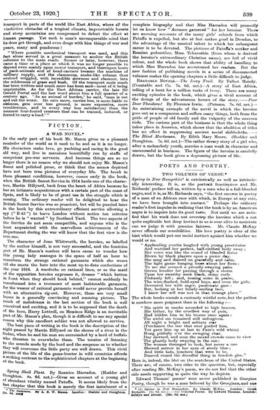POETS AND POETRY.
TWO VOLUMES OF VERSE.*
Spring in New Hampshire' is extrinsically as well as intrinsic- ally interesting. It is, as the portrait frontispiece and Mr. Richards' preface tell us, written by a man who is a full-blooded negro, and it is, as Mr. Richards says, "the first success in poetry of a man of an African race with which, in Europe at any rate, we have been brought into contact." Perhaps the ordinary reader's first impulse in realizing that the book is by an American negro is to inquire into its good taste. Not until we are satis- fied that his work does not overstep the barriers which a not quite explicable but deep instinct in us is ever alive to maintain can we judge it with genuine fairness. Mr. Claude McKay never offends our sensibilities. His love poetry is clear of the hint which would put our racial instinct against him whether we would or no.
" Applauding youths laughed with young prostitutes And watched her perfect, half-clothed body sway ; Her voice was like the sound of blended flutes Blown by black players upon a picnic day. She sang and danced on gracefully and calm, The light gauze hanging loose about her form ; To me she seemed a proudly-swaying palm Grown lovelier for passing through a storm.
Upon her swarthy neck black, shiny curls
Profusely fell ; and, tossing coins in praise, The wino-flushed, bold-eyed boys, and even the girls, Devoured her with eager, passionate gaze But, looking at her falsely-smiling face, I knew her self was not in that strange place."
The whole books sounds a curiously wistful note, but the pathos is nowhere more poignant than in the following :-
" His spirit in smoke ascended to high heaven. His father, by the cruellest way of pain,
Had bidden him to his bosom once again :
The awful sin remained still =forgiven.
All night a bright and solitary star (Perchance the one that ever guided him,
Yet gave him up at last to N ate's wild whim) Hung pitifully o'er the swinging char.
Day dawned, and soon the mixed crowds came to view The ghastly body swaying in the sun The women thronged to look, but never a one Showed sorrow in her eyes of steely blue ; And little lads, lynchers that were to be, Danced round the dreadful thing in fiendish glee."
Here is, indeed, the blot on the scuteheon of the United States. There are, of course, two sides to the question, but, especially after reading Mr. McKay's poem, we do not feel that the other
side needs supporting in quite the way ho depicts.
Edward Thomas' puerile were never published in Georgian Poetry, though he was a man beloved by the Georgians, and one
• (i) ssoss in Neu, Ilampelave. By Claude McKay. London : Brant /manes [Sr. ed. uel.]—(2) Collected P.M. By Edward Thomas. Loadoa: Selwyn and Blowd. ads. dd. wad
of them, Walter do la Mare, has written the preface to his col- lected poems—a delightful preface, full of- just praise and fine appreciation. But Edward Thomas was not a Georgian, though he was young enough to be killed in the war and his poetry bears no resemblance to theirs. If he is like anyone, which is doubtful, he is akin to A. E. Housman, though his verse is locking in that spontaneity which gives to "The Shropshire Lad " its surprising pathos. Thomas wrote on the same things ; he, too, loved the cherry-tree in bloom and noticed that the nettle flower was beautiful ; , perhaps he was the Shropshire lad grown older, after he had known war and been a journalist and lost his rustic simplicity. , One of Thomas' most attractive poems is written from a train—a thing of which one feels the real Shropshire lad barely knew the existence:—
" Yes, I remember Alderatop The name, because on, afternoon Of heat, the express train drew up there Unwontedly. It was late Juno.
And willows, willow, herb and grass, And meadowsweet, and haycocks dry, No whit loss still and lonely fair Than the high cloudlets in the sky. And for that minute a bird sang Close by, and round him, mistier, Farther and farther, all the birds Of Oxfordshire and Gloucestershire."



































 Previous page
Previous page